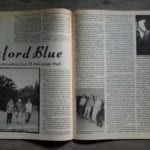Blue Mountain – Oxford Blue: Making a Mountain out of Mississippi Mud
These days are truly the dogs days for Blue Mountain.
The Oxford, Mississippi, band is currently touring in support of their second album, Dog Days, and husband-and-wife Cary Hudson and Laurie Stirratt are also raising their six-month-old part-chow, part-lab Willie. “We found him on our road, right down from our house,” Stirratt says. “We didn’t want to give him away, so we took him on the road with us.”
The band is finding acceptance with audiences as they open for the Jayhawks, Wilco and Son Volt. Raising the puppy, however, has been more trying. “We lost him for awhile in San Francisco,” Stirratt explains. “We let him off the leash on a walk and he got ahead of us.”
After searching in vain for hours, Hudson and Stirratt gave up in order to open for the Jayhawks at the Fillmore. After the concert, on a whim, Stirratt called her Oxford answering machine, as Willie had the number on an ID around his neck. “Someone called and had him. He had run about a mile away. It was terrible; I thought we were going to have to leave without him.”
Calling on a lost dog is the kind of neighborly, down-home touch that Hudson and Stirratt can relate to. Blue Mountain’s formation came about from the couple’s experiences in Los Angeles. They moved out west after the breakup of their band the Hilltops, a more punk-leaning rock band that included Stirratt’s twin brother, John, now bassist for Wilco. The L.A. experience left the couple longing for home — and their musical roots.
“When you get taken out of the environment that you grew up in,” Hudson says, “You start to realize who you are. And you start thinking about things that aren’t there. You start thinking about rain, green trees.” After 10 months of working dead-end jobs merely to pay rent and living in a crime-riddled neighborhood, Hudson and Stirratt returned to Oxford — and started concentrating on Blue Mountain. “We actually came up with the name and played a few gigs out there (in L.A.),” Stirratt says.
The soulless environment of Los Angeles pushed Hudson back to what he calls his own soul music: country. “Yeah, I started hearing country or Southern-type music in my head,” Hudson says about living in Los Angeles. “And it made me realize that being able to play that kind of music with soul is important.”
Named for a small town near Oxford, Blue Mountain blends country, blues and rock into an original sound. The band has been together for about 2-1/2 years and features lead vocalist-guitarist Hudson, bassist-vocalist Stirratt and drummer Frank Coutch.
Dog Days includes several songs that were first recorded on a self-titled, self-released album. “We recorded it for $1,000, and it sounds like a $1,000 record, too,” Stirratt says. “But that was probably the best thing we could have done to attract a record label.”
Indeed, the album got the attention of Jeff Pachman, director of A&R for Roadrunner. Pachman, who signed Uncle Tupelo for Rockville, says Blue Mountain’s live show convinced him to sign the band. He first saw them perform at one of Uncle Tupelo’s last shows in Columbia, Missouri.
“They have the capacity to play all kinds of music, and play with a lot of soul, which is pretty good for some white folks,” Pachman says. “They can play softer, more melodic songs and have no problem with just kicking out the jams.” He was surprised there wasn’t a small bidding war for the band’s services. “To me it was a no-brainer,” he says about signing the band.
Yet a major bidding war was never the aim of Hudson and Stirratt. “You want to work your way up so that you have some clout when you start dealing with a major label.” Stirratt says. “I believe in starting off on a small level. If you have some records under your belt and a fan base, then you have some clout. If you don’t, you’re at (the major labels’) mercy. If you look at all the bands that have (built up clout), they’ve had good careers. Uncle Tupelo did it really well, Husker Du did it well, and the Replacements did it well, up until the last couple albums.”
“We didn’t want to come out and have a huge first, second or third record,” Hudson says. “We want to grow organically, by word-of-mouth and touring. Many times you can have a video and the video song will be huge, but people might be responding to more what the video director’s doing than what the music is about.”
Hudson believes there will be a time for the band to do a video, but this isn’t it. He cites R.E.M. as setting a good example to follow in that regard. “I haven’t always been fans of all the music they’ve done, but I’ve always admired how R.E.M. handled their career. They didn’t even start doing videos until their fifth or sixth record.”




